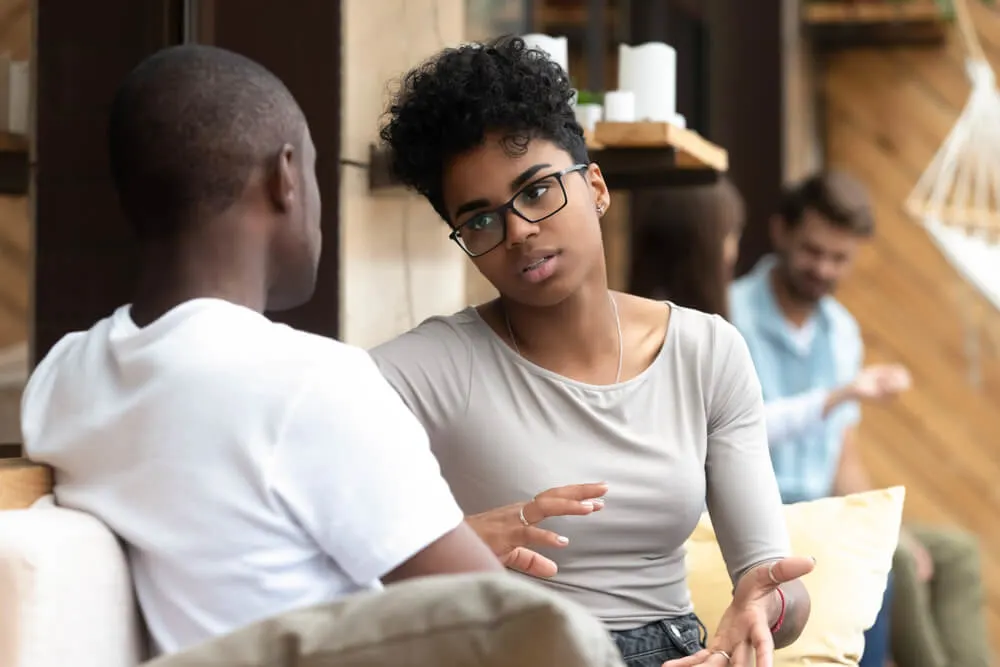Have you come to the conclusion that you are bad at conversations?
There are many potential reasons why you feel this way.
In addition to the fact that talking to others is not your strong point, to the fact that you simply do not like the topics and people you talk to.

Unfortunately, you will often be in such conversations, from boring conversations at work to small talks with neighbors that get on your nerves.
Humans are social beings who need to talk. One of the first things we learn in our development is to talk.
As much as how we are social and learn behavior patterns, it is enough proof that a baby learns to talk just by listening to parents talking.
So really, why is it so hard for you to talk to others?
You have to understand that conversation is a skill. Like all skills, the conversation can be improved.
We will compare it to riding a bicycle.
Almost everyone learns to ride a bike, but how many become professionals and participate in competitions?
It’s the same with talking, everyone knows how to speak, but that doesn’t mean they’re professionals.
Ok, you get it, but you don’t want to become a motivational speaker. You just want to make it easier for you in everyday conversations.
What part of the conversation makes you feel like you’re bad at it?
Just starting a conversation? The flow of conversation? The awkward silence that always happens because you don’t know what to say? Maybe even all of this bothers you.
In the rest of the article, we will describe some situations that make you feel like you are bad at speaking and give some tips that can help you.
Why Am I So Bad at Starting Conversations?

Some conversations you have to start, no matter how hard it seems.
It’s hard for you to start a conversation because you already know how it will end.
Those conversations can be with random people you meet along the way.
However, they can also be potentially important people to you, such as business partners or someone you have feelings for.
Starting a conversation is scary for you because you already see all the possible bad scenarios.
Why Am I so Bad at Conversations?
Here are potential reasons why you think you’re bad at talking to others:
1. Low Self-esteem

In conversation, you can feel that others are better than you because that’s how they want to present themselves or your brain perceives it in that way.
For example, when they brag about how they have a great job and career, unlike you, who hates your job and is dissatisfied with your life.
These conversations will likely be challenging for you because they additionally kill your self-confidence.
2. You Think You Are Not Eloquent Enough
This is especially pronounced if you are in a more intellectual environment.
For example, when you went to university, you probably weren’t the one who liked to raise your hand non-stop and have something to add to the professor’s presentation.
We’re kidding, of course. You weren’t that person; you were the opposite.
You always hid in the back and kept quiet because you feared saying something stupid.
You still have that fear today.
3. You Are Afraid of Being Judged
We all have different views on specific issues, and some know how to react violently to a different opinion.
You are afraid of a potential conflict if you have an opinion that does not coincide with the majority or your interlocutor.
4. Conversations Exhaust You
In addition to exhausting you because you don’t know what to say, you find them very tiring.
Other people drain your energy after the conversation, making you feel empty and tired.
Here it is not just that you are not a good speaker, but that you think you are doing something wrong because you allow other people’s speech to influence you.
5. An Awkward Silence
Ah, that uncomfortable silence; you think you can hear the crickets chirping in the background.
It may last a few seconds, but to you, it seems to last much longer.
The conversation starts nicely, but there’s a sudden silence.
Usually, the more people participate in it, the more unpleasant it is.
You are probably wondering if you are the one who needs to say something first or if you are waiting for someone else to save what can be saved from the conversation.
6. You are Oversharing
Even though you say you won’t, you always somehow overshare too much and feel bad about it afterward.
In conversation, as if your interlocutor gets too much out of you, maybe even crosses some boundaries of decency with private questions, and you naively answer them.
Maybe you expect that if you share something, the interlocutor will do the same, but you are not the only one who said everything, and now you feel stupid.
Maybe you expect too much from people in general, including in conversations.
8. You Don’t Know What to Talk About
Do you ever think, “I don’t know what to talk about with my friends, family, colleagues, etc.?”
We can’t always have topics with everyone, but not having any subjects with the people around us may signal that we are surrounded by the wrong people.
7. Shyness or Something Else
People who don’t talk too much are often said to be shy.
So what if you are shy? You can be as shy as you want unless you figure out that shyness limits you and want to change it.
Maybe you are the type who is a social butterfly on social networks and a wallflower outside of them.
What if you just don’t like to talk to others often, and it’s part of your personality?
If you’re an introvert, you usually avoid conversations with other people because you know they drain you.
Social anxiety is a more extreme reason you’re bad at talking to others.
This anxiety, like other anxieties, always sees the worst possible scenarios.
You already see in advance how uncomfortable you will be in the conversation.
You may also have physical symptoms when talking to others, such as blushing, sweating, dry throat, etc.
How to Be Better at Talking to Others?

1. Get Out of Your Head
Stop thinking about what can go wrong in the conversation. Instead, focus on what good can come out of it as well.
We know that sometimes this is easier said than done, but it’s better than being affected too much by the words of others.
Instead of comparing yourself with others, work on yourself and your self-confidence.
Remember one thing, people who need to brag non-stop and talk all the time are often deeply insecure.
2. Prepare For The Conversation in Advance
Here we mean those conversations requiring knowledge of the specific topic to participate in.
With good preparation, you won’t stop in the middle of a conversation and not know what to say, thus preventing yourself from getting a good grade, a raise, a job, etc.
3. Find topics that suit you
Maybe you should ask yourself if you are in the right circle of people because you have no fundamental topics with anyone around you.
You either stay silent or talk about random topics just to say something.
Do you think they wouldn’t talk to you if you didn’t speak to them?
In a circle of people with similar interests and views on the world, you would be much more talkative.
4. Challenge Yourself
If you think it is necessary, deliberately put yourself in situations where you must talk to people.
We know you like deep-minded conversations but cannot escape random discussions and small talks.
That way, you can practice your conversational skills.
Let it not be the topics that suit you this time. Try random topics with random people.
Pro tip: Get a dog and go to the park with it, it’s a great conversation starter with other dog owners, and we know how much they love to talk about their pets.
5. Pay attention to The Person You Are Talking to

You can’t be good at conversation if you ignore the person you’re talking to.
How do you expect to be good at conversation if you’re constantly looking at your phone and not listening to what he’s saying?
Bonus tips for better conversations:
- Be present and focused;
- Ask open-ended questions instead of Yes or No questions;
- Don’t overshare private information if another person is not doing that or you feel uncomfortable sharing;
- Say “That reminds me of” if you think that the interlocutor needs to connect with something to continue the conversation;
- Humor is almost always good, but not overdo it unless you are a stand-up comedian;
- Filter subjects that can start a conflict.
To Conclude,
Don’t limit yourself because you think you’re bad at talking to others. As we have already explained, it is a skill practiced, and there are no good speakers without practice.
With our tips, it will undoubtedly be easier for you in all those daily conversations.
We cannot guarantee that you will become the king of small talk (although we know you don’t want that either).
